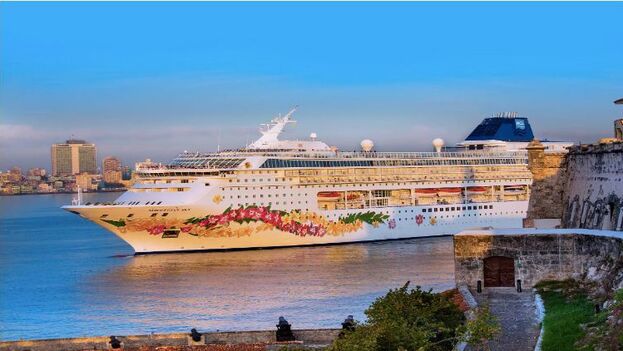
![]() 14ymedio, Havana, 31 December 2022 — On Friday, U.S. federal judge Beth Bloom sentenced the cruise companies Carnival, Royal Caribbean, Norwegian Cruise Line and MSC Cruises to pay more than 400 million dollars for docking at the Havana Port Cruise Terminal — also known as the Sierra Maestra Terminal — thereby violating Title III of the Helms-Burton Act of 1996 and activated by Donald Trump in 2019.
14ymedio, Havana, 31 December 2022 — On Friday, U.S. federal judge Beth Bloom sentenced the cruise companies Carnival, Royal Caribbean, Norwegian Cruise Line and MSC Cruises to pay more than 400 million dollars for docking at the Havana Port Cruise Terminal — also known as the Sierra Maestra Terminal — thereby violating Title III of the Helms-Burton Act of 1996 and activated by Donald Trump in 2019.
Havana Docks, the plaintiff company registered in the state of Delaware, from which Fidel Castro expropriated the port facilities in 1960, filed the case in the U.S. courts in 2019. Bloom herself determined, last March, that the accused committed the crime of usufruct and violated U.S. restrictions against Cuba “intentionally and deliberately.”
The ruling, signed by Bloom, states that considering the damage caused to Havana Docks and the complicity demonstrated by the companies, “the payment of just over 100 million dollars for each defendant is certainly reasonable.” In addition, Bloom said, the payment of a lower figure would not be in accordance with the seriousness of the offense by the companies, which have the right to appeal the sentence.
The judicial process against these four companies sets a precedent for future legal cases related to the properties seized by Fidel Castro. Also, Bloom hopes, it will serve as a warning for companies that continue to do business illegally with the Havana regime, which never compensated the companies whose assets were confiscated in the 1960s.
The Helms-Burton Act allows U.S. citizens to sue for monetary compensation for the usufruct of properties expropriated from their families and that have been used especially by shipping and hotel companies in third countries.
Havana Docks alleges that with these activities that occurred between 2015 and 2019, the four companies obtained up to 1.1 billion dollars in revenue and paid 138 million dollars to Cuban government entities.
The firms argued that their cruises to Cuba were part of the guidelines established by the Treasury Department within the “thaw” with Cuba established by the Administration of President Barack Obama (2009-2017), but the magistrate rejected those arguments, as reflected in the sentence.
She recalled that there were 12 categories, which did not pertain to tourism, nor could they undermine the U.S.embargo against Cuba.
Around 40 lawsuits against companies, especially those involved in tourism, many of them hotel companies, have been filed in courts in the U.S. since Title III was activated in 2019. Trump activated the rule that has allowed these legal processes and that his predecessors, Obama, George W. Bush and Bill Clinton never pursued because of the legal and commercial implications with third countries. Within the framework of a kind of thaw driven this year by the Joe Biden Administration, the conviction of the four cruise companies shows that the economic restrictions derived from the Helms-Burton Act are in full operation.
Translated by Regina Anavy
____________
COLLABORATE WITH OUR WORK: The 14ymedio team is committed to practicing serious journalism that reflects Cuba’s reality in all its depth. Thank you for joining us on this long journey. We invite you to continue supporting us by becoming a member of 14ymedio now. Together we can continue transforming journalism in Cuba.
